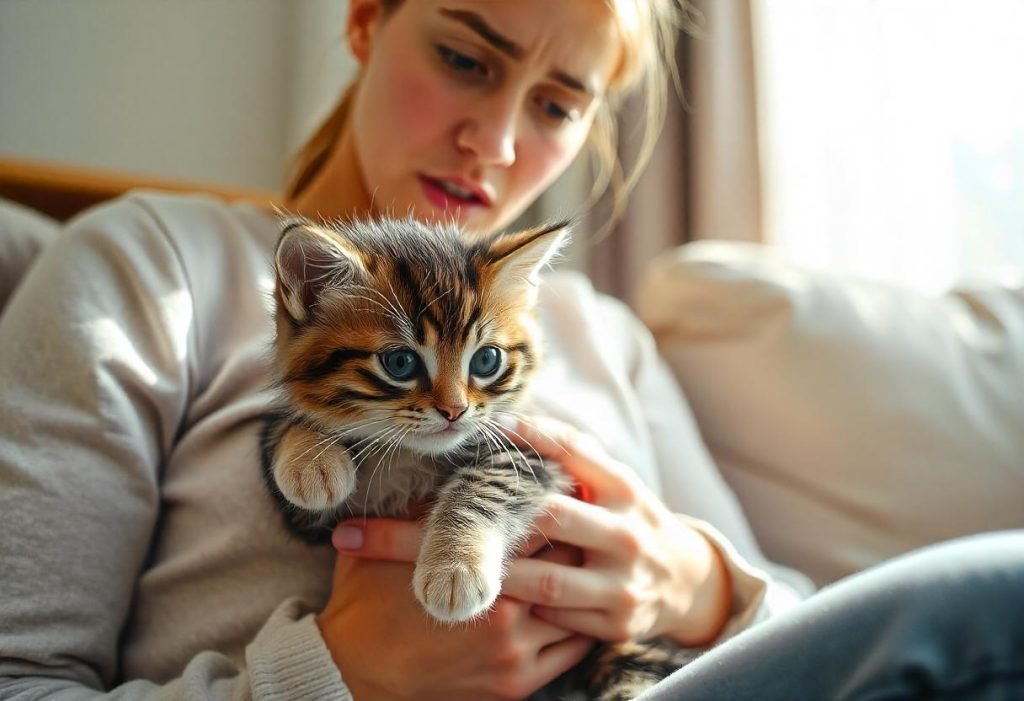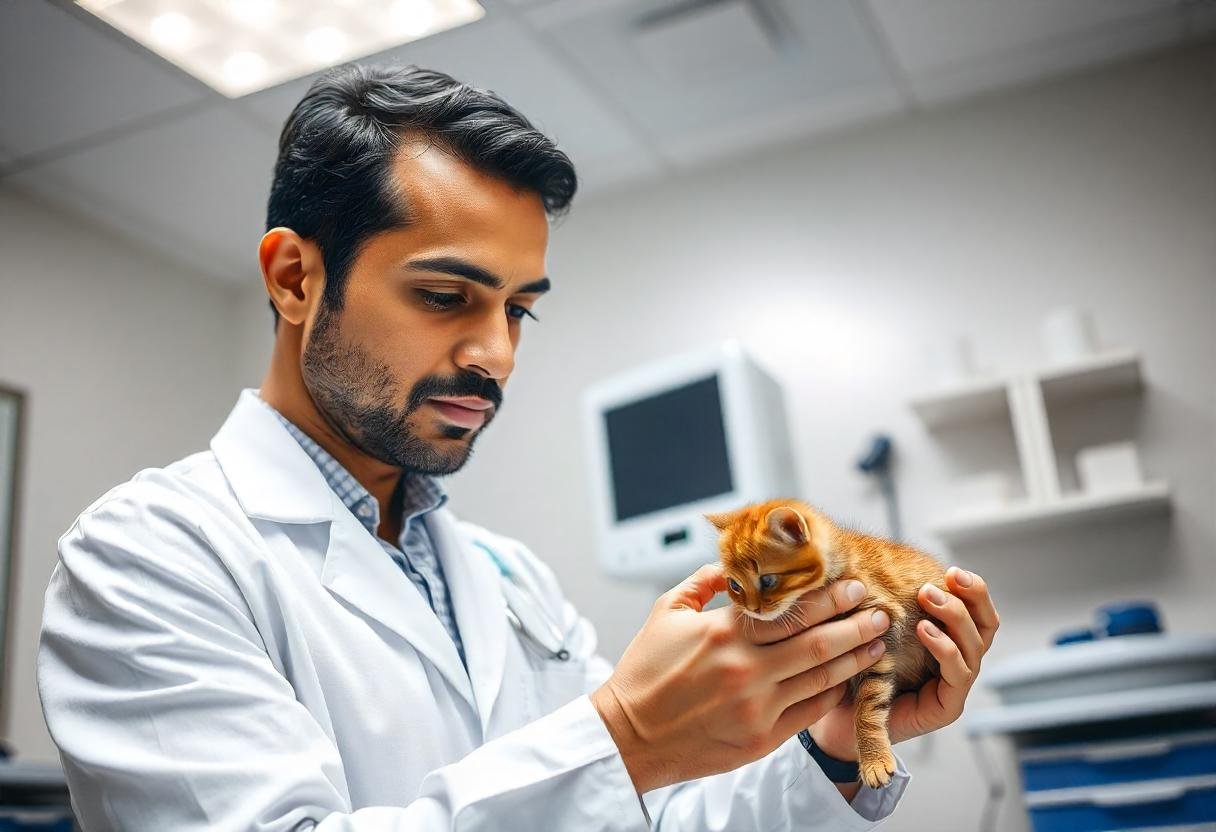Bringing home a new kitten is an exciting time, filled with playful antics and cuddly moments.
But what happens when your adorable little bundle of fur starts having diarrhea?
You might find yourself worried, wondering what’s going on to it; and why does my kitten have diarrhea and how to help.
Diarrhea in Kittens: A Common Problem
Diarrhea, also known as loose stools or diarrhoea, is a common problem in kittens. It’s a sign that something is not right with their digestive system.
Why is Diarrhea a Concern?
Diarrhea can make kittens uncomfortable and even lead to dehydration, especially if it’s severe or lasts for a long time.
It can also be a sign of a more serious underlying medical condition.

Common Causes of Diarrhea in Kittens
Diarrhea in kittens can be caused by a variety of factors, including:
- Dietary Changes: Sudden changes in diet can cause stomach upset and diarrhea in some kittens. Kittens have sensitive digestive systems, and introducing a new food too quickly can lead to problems.
- Dietary Indiscretion: Kittens, curious by nature, often explore their environment with their mouths. This can lead to them eating things they shouldn’t, such as scraps of food, plants, or even non-food items, which can cause diarrhea.
- Stress: Stress can also cause diarrhea in kittens. Stress can be triggered by a variety of factors, such as:
- Moving to a New Home: Relocating can be stressful for kittens.
- Introducing a New Pet: Adding a new pet to the household can be stressful for existing kittens.
- Veterinary Visits: Many kittens feel anxious during veterinary visits.
- Loud Noises: Loud noises, such as fireworks or thunderstorms, can be stressful for kittens.
- Infections: Bacteria, viruses, or parasites can cause diarrhea. Some common infections include:
- Campylobacter: A bacteria that can cause diarrhea, vomiting, and abdominal pain.
- E. coli: A bacteria that can cause diarrhea and other gastrointestinal issues.
- Salmonella: A bacteria that can cause diarrhea, fever, and lethargy.
- Giardia: A protozoan parasite that can cause diarrhea, vomiting, and weight loss.
- Coccidia: A protozoan parasite that can cause diarrhea and dehydration.
- Feline Inflammatory Bowel Disease (IBD): IBD is a chronic inflammatory condition of the intestines, often caused by an abnormal immune response. It can cause severe diarrhea, vomiting, and weight loss.
- Underlying Medical Conditions: Diarrhea can also be a symptom of other medical conditions, such as:
- Hyperthyroidism: An overactive thyroid gland can cause diarrhea and other digestive problems.
- Kidney Disease: Kidney disease can cause a buildup of toxins in the body, leading to digestive problems, including diarrhea.
- Liver Disease: Liver disease can impair the liver’s ability to filter toxins, leading to digestive problems, including diarrhea.
- Pancreatitis: Inflammation of the pancreas can cause diarrhea, vomiting, and abdominal pain.

What Causes Mucus Diarrhea in Kittens?
Mucus diarrhea, characterized by stools containing excess mucus, is a common symptom of colitis in kittens.
The increased mucus production is the body’s way of trying to protect the inflamed intestinal lining.
- Infections: Bacterial or parasitic infections can cause inflammation in the intestines, leading to mucus in the stool.
- Dietary Indiscretion: Eating something irritating, like a piece of string or a rubber band, can trigger inflammation and mucus production.
- Stress: Stress can also cause inflammation in the intestines, leading to mucus in the stool.
A Case Study: Whiskers’ Digestive Distress
Whiskers, a 5-month-old Maine Coon kitten, had been experiencing bouts of diarrhea.
His owner, David, noticed that Whiskers was having frequent, loose stools, and he seemed to be straining to defecate. He also started eating less and losing weight.
“Whiskers was usually so playful and energetic,” David says. “But he’s become lethargic, and he’s not interested in playing with his toys.
It was worrying to see him feeling so unwell.”
David took Whiskers to the vet. The veterinarian performed a physical exam and ran blood tests.
The veterinarian suspected that Whiskers had colitis, possibly triggered by stress from a recent move. “The veterinarian recommended a bland diet and medication to help soothe Whiskers’ digestive system,” David says.
Diagnosing Diarrhea in Kittens
Diagnosing the cause of diarrhea in kittens requires a thorough examination by a veterinarian.
They will perform a physical exam, ask about your kitten’s history, and often recommend some additional testing.
- Physical Examination: The veterinarian will assess your kitten’s overall health, including their weight, body condition, and any signs of illness. They will check your kitten’s temperature, pulse, and respiration, and they will examine their eyes, ears, nose, teeth, and gums. They will also feel your kitten’s abdomen and lymph nodes for any abnormalities.
- Bloodwork: Blood tests can help rule out a variety of medical conditions, such as hyperthyroidism, kidney disease, liver disease, or anemia.
- Urinalysis: A urinalysis can help to assess kidney function, which can be affected by a number of medical conditions.
- Fecal Examination: A fecal examination can detect intestinal parasites.
- Radiographs (X-rays): X-rays can help to identify any abnormalities in the internal organs, which could indicate a medical condition.
- Ultrasound: Ultrasound can provide a more detailed view of the internal organs, helping to identify any abnormalities.
- Endoscopy: In some cases, your veterinarian might recommend an endoscopy, a procedure where a thin, flexible tube with a camera is inserted into the esophagus, stomach, or intestines to examine the lining for signs of inflammation or other problems.
- Biopsy: If your veterinarian suspects IBD or other inflammatory conditions, they may recommend a biopsy to examine the tissue for signs of inflammation.
Treating Diarrhea in Kittens
Treatment for diarrhea in kittens depends on the underlying cause.
- Dietary Changes: If diarrhea is caused by a change in diet, your veterinarian can help you choose a food that’s appropriate for your kitten’s age, breed, and activity level.
- Stress Reduction: Try to reduce stress in your kitten’s environment by:
- Providing Safe Spaces: Offer your kitten a quiet, comfortable space where they can feel secure.
- Using Pheromone Diffusers: Pheromone diffusers can help to create a calming environment.
- Playing with Your Kitten: Playtime can help to relieve stress.
- Medications: If diarrhea is caused by a medical condition, your veterinarian may prescribe medications to treat the underlying problem. For example:
- Antibiotics: Medications to treat bacterial infections.
- Antifungal Medications: Medications to treat fungal infections.
- Anti-Inflammatory Medications: Medications to reduce inflammation in the intestines.
- Medications to Treat Hyperthyroidism, Kidney Disease, or Liver Disease: Medications to manage the underlying medical condition.
- Dietary Management: If your kitten has colitis, your veterinarian may recommend a bland diet for a few days. Bland diets typically consist of cooked chicken or turkey and white rice.
- Fiber Supplements: Adding a small amount of fiber to your kitten’s diet can help promote regular bowel movements and soothe the digestive system. You can add fiber in the form of canned pumpkin, cooked oatmeal, or fiber supplements.
A Case Study: Whiskers’ Recovery
Whiskers, the Maine Coon kitten with colitis, responded well to treatment.
The veterinarian prescribed him antibiotics and recommended a bland diet. David also started using a calming pheromone diffuser in Whiskers’ home to help reduce stress.
“Whiskers felt much better after a few days,” David says. “He was back to his playful self, and he’s been doing much better since then.”
Tips for Caring for a Kitten with Diarrhea
- Monitor Your Kitten’s Behavior: Pay close attention to your kitten’s behavior, especially if they’re having diarrhea or showing other signs of illness. Look for signs of discomfort or distress, such as:
- Restlessness: Pacing or hiding more than usual.
- Lethargy: Sleeping more than usual.
- Changes in Appetite: Refusing to eat or having difficulty eating.
- Dehydration: Dry gums, sunken eyes, or decreased skin elasticity.
- Provide Fresh Water: Make sure your kitten has access to fresh water at all times.
- Consult a Veterinarian Immediately: If your kitten is having frequent diarrhea, or if they have blood or mucus in their stool, or if they have a fever or other concerning symptoms, consult your veterinarian immediately. These could be signs of a serious medical condition that requires treatment.
Conclusion
Diarrhea in kittens can be a serious condition, but it’s often treatable with proper care.
By understanding the causes and recognizing the symptoms of diarrhea, you can work with your veterinarian to develop a treatment plan that’s right for your kitten.
Remember, every kitten is unique, and their diarrhea might require a different approach.

Leave a Reply